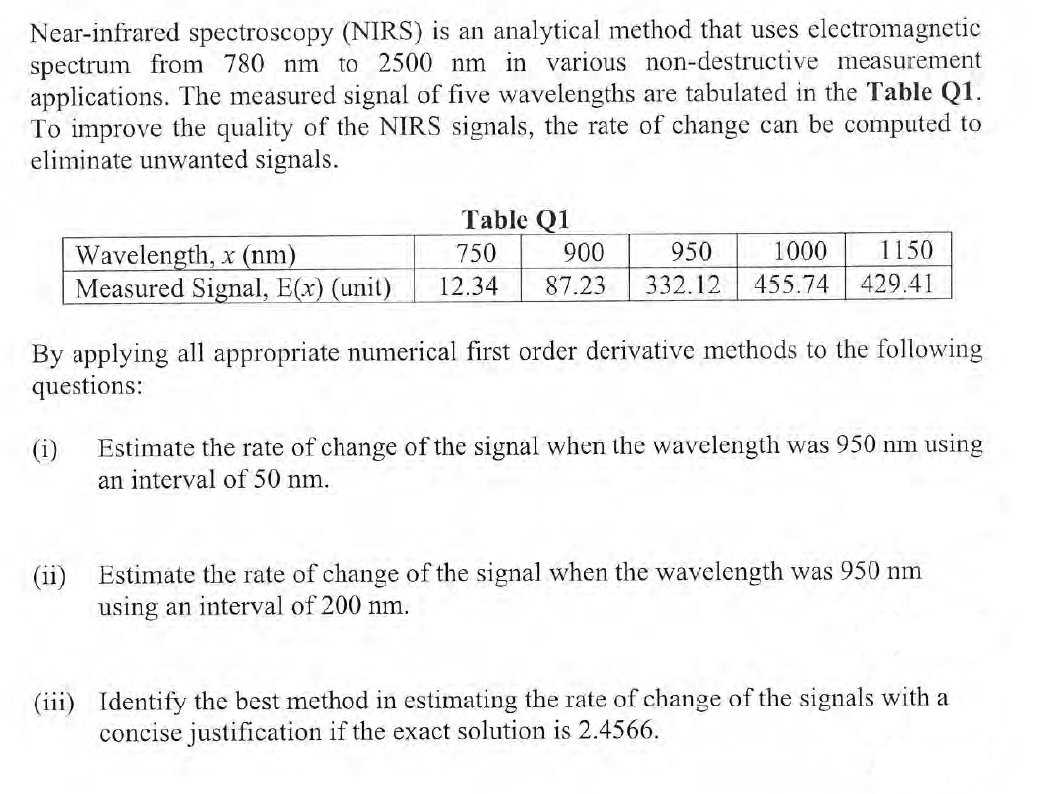Table Q1 1150 Wavelength, x (nm) Measured Signal, E(x) (unit) 750 900 950 1000 12.34 87.23 332.12 455.74 429.41 By applying all appropriate numerical first order derivative methods to the following questions: Estimate the rate of change of the signal when the wavelength was 950 nm using an interval of 50 nm. (i) (ii) Estimate the rate of change of the signal when the wavelength was 950 nm using an interval of 200 nm.
Table Q1 1150 Wavelength, x (nm) Measured Signal, E(x) (unit) 750 900 950 1000 12.34 87.23 332.12 455.74 429.41 By applying all appropriate numerical first order derivative methods to the following questions: Estimate the rate of change of the signal when the wavelength was 950 nm using an interval of 50 nm. (i) (ii) Estimate the rate of change of the signal when the wavelength was 950 nm using an interval of 200 nm.
Chapter6: Exponential And Logarithmic Functions
Section6.8: Fitting Exponential Models To Data
Problem 3TI: Table 6 shows the population, in thousands, of harbor seals in the Wadden Sea over the years 1997 to...
Related questions
Question

Transcribed Image Text:Near-infrared spectroscopy (NIRS) is an analytical method that uses electromagnetic
spectrum from 780 nm to 2500 nm in various non-destructive measurement
applications. The measured signal of five wavelengths are tabulated in the Table Q1.
To improve the quality of the NIRS signals, the rate of change can be computed to
eliminate unwanted signals.
Table Q1
1000
1150
Wavelength, x (nm)
Measured Signal, E(x) (unit)
750
900
950
12.34
87.23
332.12
455.74
429.41
By applying all appropriate numerical first order derivative methods to the following
questions:
(i)
Estimate the rate of change of the signal when the wavelength was 950 nm using
an interval of 50 nm.
(ii)
Estimate the rate of change of the signal when the wavelength was 950 nm
using an interval of 200 nm.
(iii) Identify the best method in estimating the rate of change of the signals with a
concise justification if the exact solution is 2.4566.
Expert Solution
This question has been solved!
Explore an expertly crafted, step-by-step solution for a thorough understanding of key concepts.
Step by step
Solved in 4 steps

Recommended textbooks for you


Linear Algebra: A Modern Introduction
Algebra
ISBN:
9781285463247
Author:
David Poole
Publisher:
Cengage Learning

Big Ideas Math A Bridge To Success Algebra 1: Stu…
Algebra
ISBN:
9781680331141
Author:
HOUGHTON MIFFLIN HARCOURT
Publisher:
Houghton Mifflin Harcourt


Linear Algebra: A Modern Introduction
Algebra
ISBN:
9781285463247
Author:
David Poole
Publisher:
Cengage Learning

Big Ideas Math A Bridge To Success Algebra 1: Stu…
Algebra
ISBN:
9781680331141
Author:
HOUGHTON MIFFLIN HARCOURT
Publisher:
Houghton Mifflin Harcourt

Functions and Change: A Modeling Approach to Coll…
Algebra
ISBN:
9781337111348
Author:
Bruce Crauder, Benny Evans, Alan Noell
Publisher:
Cengage Learning

Algebra & Trigonometry with Analytic Geometry
Algebra
ISBN:
9781133382119
Author:
Swokowski
Publisher:
Cengage

College Algebra
Algebra
ISBN:
9781305115545
Author:
James Stewart, Lothar Redlin, Saleem Watson
Publisher:
Cengage Learning